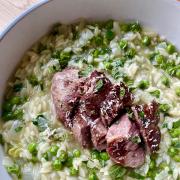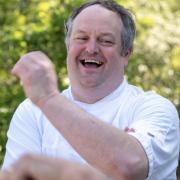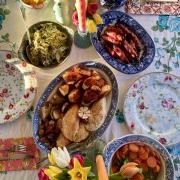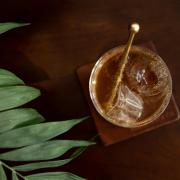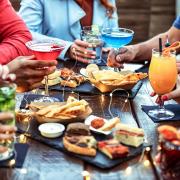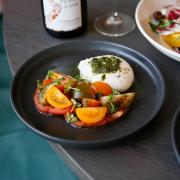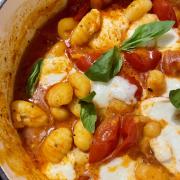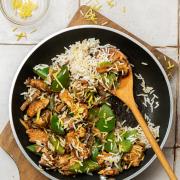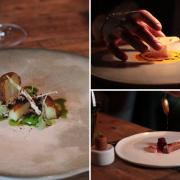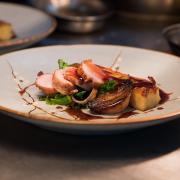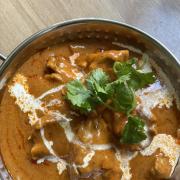Down a winding gravel track, off the main road in the little Hampshire hamlet of Neacroft, you’ll find the Sticky Sisters – a group of passionate beekeeping individuals
Founded in 2019, what started out as a hobby has now become a thriving local business, selling not just honey but natural soaps, candles and bath bombs. The Sticky Sisters team consists of sisters, Ann Blake and Jane Adams and their long-time friends, husband and wife Teresa and Garry Elcock, who’s land the hives are situated on.

Ann talks us through how it all began, back in 2017: ‘We met a lady called Margaret at a country market selling honey, who had kept bees since the age of eight and she was in her 80s. We got chatting with her and joined one of the clubs to learn more. We bought out first set of bees from the club and used to see her every week and ask her loads of questions. She was very inspirational.’
Jane adds: ‘She was the top UK honey judge, so she was very knowledgeable and had been a bee farmer and worked for The National Trust. She knew so much.’
After Margaret passed away, her daughter donated all her bee keeping equipment to the sisters, knowing their enthusiasm to follow in her footsteps. Ann remembers: ‘It included an electric spinner to extract the honey from the comb. Some of the wooden hives needed some sprucing up but it set us on our way.’

In a serendipitous moment, Teresa and her husband Garry had recently closed their catering business, Lettuce Eat, and were interested in utilising their space and unused catering kitchen as she explains: ‘I had a big party at mine when we were shutting down our catering business. It was my 60th and my husband Garry’s 70th. Ann and Jane came along. We’d all known each other for years and used to play for Bournemouth hockey team together. We’d often been told by friends that our garden would be perfect for bees but were a little worried about the commitment.
‘You need a lot of equipment to look after bees. We now have two bee sheds, a bee store and a bee kitchen!’
After they had collected their first batch of honey, the Sticky Sisters dropped leaflets around the village to let the locals know they had small amount for sale. They gave each household a sealed sample straw to give them a little taste. Teresa remembers: ‘there are 92 dwellings here and over 40% came back to us and said yes, we want to buy some. So, we jarred up as much as we could and delivered it in person. Our honey went just like that and we sold out. We realised we needed to invest more in ourselves. We bought some bees and further kit and that has paid off as we’ve been able to make more honey.’

There are a range of different types of honey available and all are 100% natural and raw, all spun directly out of the honeycomb frame and placed into jars. They proudly support the sustainability of bees and only take honey that is excess to the bee’s needs, supporting them in a way that is harmonious to their natural behaviour.
Jane explains: ‘There are three types of honey in this area – the hard honey at the beginning of the season which is from the bees foraging on yellow fields of rapeseed, the summer honey is golden and runny. Then at the end, if you’re really lucky – you get heather honey which is bubbly. It is very strong and you either love it or hate it, but a lot of people adore it. What we get all depends on the weather and what the bees have been foraging on.’
Recently, the team have created a special Lemon Honey which is infused with fresh lemons from Spain.

Teresa shares: ‘Garry goes backwards and forwards to our property in Spain to see his mother and each time brings back fresh lemons that the local farmer has picked from the lemon groves. They are absolutely gorgeous. We peel them and put the rinds into the raw honey. That always flies off the shelf, it’ so tasty. We also make marmalade and put ginger and honey in it. So, we utilise every bit, we don’t want waste.’
Not all of the honey created is sellable due to the consistency; this is when Ann came up with the idea of making skincare products with this part of the batch. Honey is well-known for its extensive antioxidant, anti-fungal and anti-bacterial proprieties and every single ingredient used in the creation of the products is natural and soothing to the skin, including shea butter, oils and oats. Their soap, bath bombs, shower steamers and bath dusts, all contain the very special ingredient – Sticky Sisters honey.

Ann has now created 15 varieties of soap, including a soap especially for animals, which has become very popular.
Not just great on top of our skin, honey’s health benefits continue inside the body too. The pollen the bees collect and bring back to the hive is all sourced from plants grown locally – since many allergies are caused by these same plants, eating honey that contacts that pollen could potentially combat hayfever and pollen allergies. But what’s the team’s favourite part of being a beekeeper? For Theresa, it’s the customers: ‘I’ve always enjoyed having contact with people and seeing the joy on their face when I hand them honey that has been created on their doorstep.’
‘Just watching the bees and learning from them, they are fascinating’, says Jane. Ann agrees, ‘I love it. Just one bee makes two teaspoons of honey in its entire life. These tiny insects play a critical role in the preservation of our ecosystem and are the world’s most important pollinators, keeping people and the planet healthy.’ stickysistershoney.com





